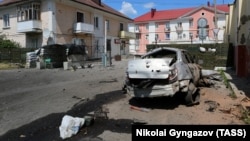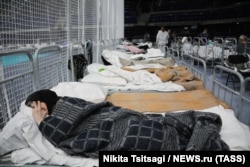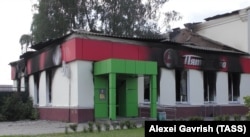SHEBEKINO, Russia -- Following a spate of recent attacks in the region, Sergei says he decided to make the journey from his home in St. Petersburg to the city of Belgorod, which is only 40 kilometers from the Ukrainian border, looking to join the local territorial defense unit.
Shelling and sabotage brought the war home to the border region in recent months, but a string of attacks in the last few weeks, most recently by militia groups aligned against Moscow, has left a wake of destruction and sparked the largest military evacuation effort in Russia in decades.
Sergei -- like most who spoke to North.Realities, a regional news outlet of RFE/RL's Russian Service, insisted on being identified only by his first name -- says that he wanted to join the war and fight in Ukraine but that he wasn’t accepted due to chronic illnesses that have developed in his 50s.
After hearing reports of the escalating border attacks, he says he decided to make the trip from St. Petersburg and see if the volunteer territorial defense units in Belgorod city or Shebekino -- a nearby town that’s only 10 kilometers from the Ukrainian border -- would let him join.
“I still want to be useful,” Sergei says. “I want to help keep order and protect against attacks.”
Shebekino, a town of 40,000, has effectively become a new part of the front line as attacks have intensified inside Russia, including on residential areas. The assaults have brought the war firmly to Russia’s doorstep 15 months after Russian missiles first bombarded Kyiv and kicked off Moscow’s full-scale invasion.
Belgorod’s regional governor, Vyacheslav Gladkov, says more than 2,500 residents had been evacuated in the most recent attacks and taken to temporary shelters in sports arenas farther away from the border. Some 4,000 were also evacuated from the region in early June and thousands more have also left on their own, according to interviews conducted by RFE/RL.
The total number of casualties from the attacks is unclear, but officials have said that at least 13 people have died since the beginning of the massive shelling of the Belgorod region’s border areas and more than 50 have been injured.
The Front Line Comes Home
Back in Belgorod, the summer heat has fully set in and at first glance normal life appears to be in full-swing, with children playing in parks, pensioners selling flowers, and students hurrying to class to take their end-of-year exams.
But the growing signs of war are everywhere in the city. Long queues stretch down Koroleva Street from Cosmos Stadium as those affected by the attacks or forced to evacuate other border towns have come for humanitarian aid.
Billboards calling for support for the “special military operation” -- the term Moscow uses for its invasion of Ukraine -- lined the area, along with faded posters for May’s Victory Day celebrations. Outside one of the volunteer tents by the stadium, a couple emerged holding bags of food, with the man wearing a T-shirt with a large “Z” across the stomach -- a symbol of Russia’s war -- while the woman’s shirt read: “Feeling Good, Looking Cool.”
Many of those who were in line for aid expressed their support for Russia’s war in Ukraine, although many voiced frustration that Russian forces had pulled out of Kharkiv, the region of Ukraine that borders the Belgorod region, last September. The area is now back under Ukrainian control, and Russia officials have said that Kyiv has used it to launch attacks.
Flare-ups and cross-border shelling between Ukrainian and Russian forces have occurred regularly throughout the war.
The recent attacks on Belgorod were reportedly undertaken by two paramilitary groups -- the Free Russia Legion and the Russian Volunteer Corps -- that claim to be made up of Russians and fighting for Ukraine’s cause. The groups said they target only security infrastructure and portrayed their fight as one for liberation from Russian President Vladimir Putin’s long rule.
But videos and firsthand accounts have also shown destruction of residential areas inside Russia. The Russian Volunteer Corps has acknowledged shelling Shebekino’s urban area with “bouquets of Grads,” a Soviet-designed multiple-rocket launcher.
Ukraine has denied that its military is involved in the incursions into Belgorod. How these groups arm themselves and operate from Ukrainian soil is unclear, however.
At another distribution point for humanitarian aid, this time set up at Belgorod’s Five Stars shopping center, the queue moves more slowly, and many of those lined up say they are from Shebekino and have been waiting for over three hours.
“You can note that we are unhappy with this,” says Viktor, an elderly man waiting in line who left Shebekino and is now staying with relatives in Belgorod.
“It's hot here, no one delivers water to drink, and there are no doctors, either. Several hundred people are just left standing here,” Viktor continues. “The attitude [from the authorities] was better toward refugees from Ukraine.”
'It's All Nearly Empty Now'
To Viktor and some others in the region, the assaults on Shebekino, the most sustained attacks on a Russian town since the start of the war, have made clear Moscow’s lack of concern for their fate.
“[Shebekino] is dead. It’s all nearly empty now,” Vitkor says. “There’s only one person still left on my street.”
Many analysts have speculated that part of the motivation for the attacks across Belgorod is to break Russian morale and curb domestic support for the war effort.
Based on the recent trip to Shebekino and Belgorod by RFE/RL, most residents still appear to be firmly in support of the campaign under way in Ukraine, but the attacks appear to have deepened frustrations with Russia’s state-run media.
The government has devoted little time on the main state-controlled TV channels to the destruction in Shebekino, an apparent attempt to avoid alarming people. It has also made little or nothing of the bombardment and killing of civilians.
Some residents who spoke to RFE/RL in Shebekino expressed anger at how state television anchors struggled to pronounce the town’s name, even as they lauded the evacuation efforts.
Others expressed dismay and confusion at comments by State Duma Deputy Andrei Gurulev, a member of the Defense Committee, who seemed to call for the “bombing” of Shebekino while on the air with Russian propagandist Vladimir Solovyov.
Despite the attacks, polls show that a majority of Russians are not paying close attention to the war in Ukraine or the assaults on Russian soil.
According to a May poll from the independent Moscow-based Levada Center, only 1-in-4 Russians are following the war closely and willing to go beyond state media for information about it. Almost half of the respondents said they either follow the war cursorily or not at all.
In response to the attacks, local authorities have begun to offer 50,000 rubles (approximately $650) to those affected or displaced by the fighting. The small sums provoked outrage from those waiting in humanitarian lines who spoke to RFE/RL and in Telegram groups.
“It’s everyone for themselves,” Viktor said. “People in Shebekino are dying. We don't need [government] slogans.”
Written by Reid Standish based on reporting by Oleg Artyushenko for North.Realities, a regional news outlet of RFE/RL's Russian Service.











